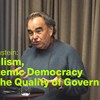meritocratic
The Role of Education for Intergenerational Income Mobility: A comparison of the United States, Great Britain, and Sweden
Social Forces, Volume 96, Issue 1, pp. 121–152, doi.org/10.1093/sf/sox051 Abstract Previous studies have found that intergenerational income persistence is relatively high in the United States and Brita
Status hierarchies, gender bias and disrespect in review panel groups: ethnographical observations from the Swedish Research Council
In: Acker S., Ylijoki O-H., and McGinn M. The Social Production of Research: Perspectives on funding and gender. Society for Research into Higher Education (SRHE)/Routledge. Abstract Status as been descri
Myths and truths about "the experiment"
The Swedish response to Covid-19 put in context.
Bo Rothstein: Populism, Epistemic Democracy and the Quality of Government
Place: At the Institute for Futures Studies, Holländargatan 13, Stockholm, or online. REGISTER for on site or online participation Abstract A special branch of political philosophy deals with the issue of

Populism, Epistemic Democracy and the Quality of Government
Research seminar with Bo Rothstein, Professor of Political Science, and affiliated researcher at the Institute for Futures Studies. A special branch of political philosophy deals with the issue of the
Bo Rothstein: A social science dilemma. Is there a contradiction between democracy and quality of government?
Research seminar with Bo Rothstein.AbstractMost definitions of democracy rely on a set of procedural rules for how political power should be accessed legitimately. The basic norm for these procedural ru realized by equal democratic rights. In this understanding of political legitimacy, democracy is a “partisan game” where various interests are given fair possibilities to compete for political power. The concept of “quality of government” relates to the legitimacy in the of political power and is based on the norm of that is the opposite of partisanship. This is to be realized by, for example, the rule of law and a public administration built on meritocracy. Several tensions between these two bases for achieving political legitimacy will be present. For example, a democratically elected government may want to politicize the public administration and may establish public services and benefits directed only to their political supporters. The rule of law includes the principle of equality before the law, but a democratically elected government may take actions that put itself “above” the law. Various empirical measures and philosophical principles for understanding these type of tensions between democracy and the quality of government will be presented in this lecture.

Bo Rothstein: Is there a contradiction between democracy and quality of government?
Most definitions of democracy rely on a set of procedural rules for how political power should be accessed legitimately. The basic norm for these procedural rules is according to noted democracy theor
Torsten Persson: Who Becomes a Politician?
Torsten Persson is Professor of Economics at Institute for International Economic Studies, Stockholm University. ABSTRACT Can a democracy attract competent leaders, while attaining broad representation?








